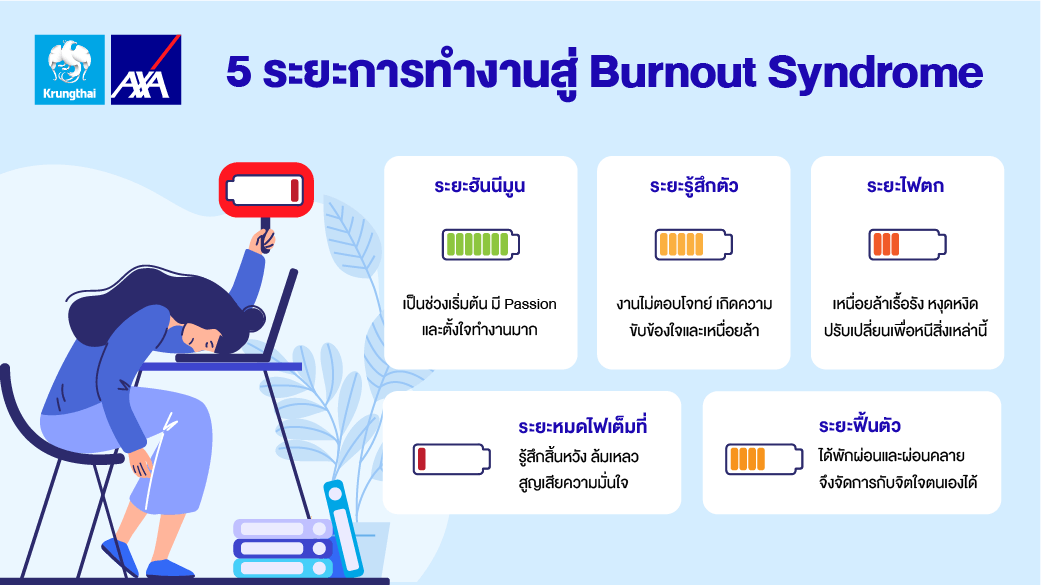Although measures to control the spread of Covid-19 have started to be relaxed, many organizations still allow their employees to work from home. However, as we now know, this can cause stress from working hard without a break and continuous focus on the computer screen, tablet or mobile. That’s why many people say they find working at home more tiring than working in the office. The result can be excessive fatigue from working or “Burnout Syndrome”.
Chronic stress can cause burnout syndrome
Burnout syndrome is caused by working too hard, until chronic stress accumulates resulting in mental changes. What starts with fun feelings, intention and inspiration to work, evolves into being over tired and not wanting to work. This progresses further to seeing work in a negative light, a feeling of not being up to the task and not succeeding. Ultimately, this leads to distancing from colleagues and customers.
5 stages of working leading to burnout syndrome
1. The Honeymoon Period is when you start the work. In this stage, we have a lot of passion, are fully dedicated to the job and do everything to fit in with colleagues and the organization.
2. The Awakening occurs when we’ve been working for a while. One starts to feel that work is no longer delivering the expected returns in terms of position, expectations, and acceptance. Frustration and exhaustion follow, leading to feeling that life is going wrong and we can’t cope.
3. Brownout is when negative feelings and chronic fatigue make us easily irritated. Our mind responds by adjusting our lifestyle to escape resentment such as by overspending or drinking. This, in turn, causes performance degradation, leading to separation from colleagues and criticizing our organization.
4. Full Scale Burnout is when we begin to feel hopeless and that we are failing and we lose self-confidence. This is what happens when we entertain the brownout stage too long and don’t sort things out in our own mind.
5. The Phoenix Phenomenon is when we begin to deal with our own mentality by making space to relax and engage in leisure pursuits, say watching movies, listening to music or joining a drawing class. We can also push ourself to exercise, so our body releases “happy hormones” (endorphins, dopamine, serotonin), and stay healthy. We should reset our work expectations and goals more realistically. This will all reduce stress and pressure from work until we finally feel inspired again.
6 questions to check if you have burnout syndrome
Answering these six questions will help you determine whether you have burnout syndrome:
1. Are you feeling severely stressed or tired or can’t sleep due to overwork?
2. Do you approach your work every morning with fear and worry?
3. Do you worry about work even outside of your working day?
4. Have you ever severely insulted or viewed colleagues or customers negatively or just wanted to get away from them?
5. Do easy tasks sometimes feel difficult?
6. Have you encountered any physical problems such as headache, chronic fatigue or muscle ache?
Burnout syndrome is treatable
If we realize we do have burnout syndrome, we should consider that a good thing as it will make us pay more attention to ourselves and we can apply solutions. Here are some of the things we can do to relieve the stress that causes the condition:
1. Get adequate good quality sleep.
2. Exercise regularly with an emphasis on cardio activities that make the heart and blood vessels work. Studies show that this significantly reduces burnout syndrome in as little as four weeks.
3. Practice mindfulness meditation. Applications available on your mobile teach specific areas of mindfulness meditation that target stress relief, anxiety relief and dealing with pain. Practicing 10 minutes or more every day can improve our state of mind and body enormously.
4. Practice meditation through breathing to exercise the respiratory system. Simply take four breaths in and four breaths out, focusing on each breath. Count 1 to 8 when inhaling and count 1 to 8 as you exhale slowly through your mouth.
Last but not least, it is important to be able to distinguish between burnout syndrome and depression as they share some similar symptoms. For clarification, consult a psychiatric specialist at a hospital or psychiatric clinic.
For more information about Krungthai-AXA Life Insurance, please visit http://www.krungthai-axa.co.th/th/HealthServices
References
• Faculty of Medicine, Siriraj Hospital
https://www.si.mahidol.ac.th/th/healthdetail.asp?aid=1385
• Department of Mental Health
https://www.dmh.go.th/news/view.asp?id=2270
• Phyathai Hospital
https://1th.co/go41c41c41c


